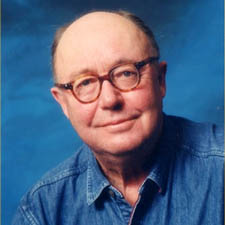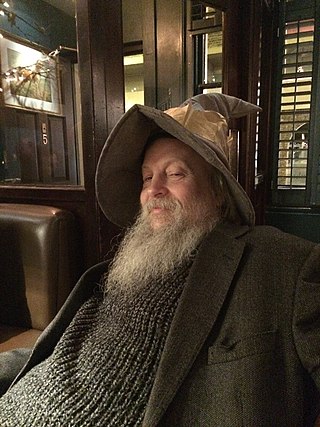Related Research Articles
Andrew D. Gordon is a British computer scientist previously employed by Microsoft Research. His research interests include programming language design, formal methods, concurrency, cryptography, and access control.
In computer science, communicating sequential processes (CSP) is a formal language for describing patterns of interaction in concurrent systems. It is a member of the family of mathematical theories of concurrency known as process algebras, or process calculi, based on message passing via channels. CSP was highly influential in the design of the occam programming language and also influenced the design of programming languages such as Limbo, RaftLib, Erlang, Go, Crystal, and Clojure's core.async.

Manuel Blum is a Venezuelan born American computer scientist who received the Turing Award in 1995 "In recognition of his contributions to the foundations of computational complexity theory and its application to cryptography and program checking".

The Needham–Schroeder protocol is one of the two key transport protocols intended for use over an insecure network, both proposed by Roger Needham and Michael Schroeder. These are:
A cryptographic protocol is an abstract or concrete protocol that performs a security-related function and applies cryptographic methods, often as sequences of cryptographic primitives. A protocol describes how the algorithms should be used and includes details about data structures and representations, at which point it can be used to implement multiple, interoperable versions of a program.
Provable security refers to any type or level of computer security that can be proved. It is used in different ways by different fields.
Andrew William Roscoe is a Scottish computer scientist. He was Head of the Department of Computer Science, University of Oxford from 2003 to 2014, and is a Professor of Computer Science. He is also a Fellow of University College, Oxford.
CSP may refer to:

The Department of Computer Science is the computer science department of the University of Oxford, England, which is part of the university's Mathematical, Physical and Life Sciences Division. It was founded in 1957 as the Computing Laboratory. By 2014 the staff count was 52 members of academic staff and over 80 research staff. The 2019, 2020 and 2021 Times World University Subject Rankings places Oxford University 1st in the world for Computer Science. Oxford University is also the top university for computer science in the UK and Europe according to Business Insider. The 2020 QS University Subject Rankings places The University of Oxford 5th in the world for Computer Science.
Michael Schroeder is an American computer scientist. His areas of research include computer security, distributed systems and operating systems and he is perhaps best known as the co-inventor of the Needham–Schroeder protocol. In 2001 he co-founded the Microsoft Research Silicon Valley lab and was the assistant managing director until the lab was disbanded in 2014.

In cryptography, a nonce is an arbitrary number that can be used just once in a cryptographic communication. It is often a random or pseudo-random number issued in an authentication protocol to ensure that old communications cannot be reused in replay attacks. They can also be useful as initialization vectors and in cryptographic hash functions.

Michael J. Butler is an Irish computer scientist. As of 2022, he is professor of computer science and Dean of the Faculty of Engineering and Physical Sciences at the University of Southampton, England.
Martín Abadi is an Argentine computer scientist, working at Google as of 2024. He earned his Doctor of Philosophy (PhD) in computer science from Stanford University in 1987 as a student of Zohar Manna.

Roger Michael Needham was a British computer scientist.
Quantum cryptography is the science of exploiting quantum mechanical properties to perform cryptographic tasks. The best known example of quantum cryptography is quantum key distribution, which offers an information-theoretically secure solution to the key exchange problem. The advantage of quantum cryptography lies in the fact that it allows the completion of various cryptographic tasks that are proven or conjectured to be impossible using only classical communication. For example, it is impossible to copy data encoded in a quantum state. If one attempts to read the encoded data, the quantum state will be changed due to wave function collapse. This could be used to detect eavesdropping in quantum key distribution (QKD).

Michael Goldsmith is a British computer scientist, senior research fellow and Lecturer at the University of Oxford, England. He is a member of Oxford University's Department of Computer Science. He is an associate director of Oxford University's Cyber Security Centre, and an Oxford Martin Fellow of The Global Cyber Security Capacity Centre. He is a fellow of Worcester College, Oxford.
Casimier Joseph Franciscus "Cas" Cremers is a computer scientist and a faculty member at the CISPA Helmholtz Center for Information Security in Saarbruecken, Germany.
Steve Schneider FBCS, CITP is an English computer scientist and Professor of Security. He is Director of the Surrey Centre for Cyber Security and Associate Dean at the University of Surrey.
Ran Canetti is a professor of Computer Science at Boston University. and the director of the Check Point Institute for Information Security and of the Center for Reliable Information System and Cyber Security. He is also associate editor of the Journal of Cryptology and Information and Computation. His main areas of research span cryptography and information security, with an emphasis on the design, analysis and use of cryptographic protocols.
References
- 1 2 3 4 "Gavin lowe". St Catherine's College, Oxford . Retrieved 10 February 2018.
- ↑ "Ex-Staff - University of Leicester". University of Leicester . Retrieved 10 February 2018.
- 1 2 3 "Gavin Lowe". Department of Computer Science, University of Oxford . Retrieved 10 February 2018.
- 1 2 "OU Cave Club History". www.oucc.org.uk. Retrieved 11 February 2018.
- 1 2 Lowe, Gavin (1994). Probabilities and priorities in timed CSP (DPhil). University of Oxford.
- ↑ "Publications by Gavin Lowe". University of Oxford . Retrieved 10 February 2018.
- ↑ Lowe, Gavin (November 1995). "An attack on the Needham-Schroeder public key authentication protocol". Information Processing Letters. 56 (3): 131–136. CiteSeerX 10.1.1.394.6094 . doi:10.1016/0020-0190(95)00144-2 . Retrieved 17 April 2008.
- ↑ "Cryptography is Hard".
- ↑ Computer security, ESORICS 96 : 4th European Symposium on Research in Computer Security, Rome, Italy, September 25–27, 1996 : proceedings. Bertino, Elisa. Berlin: Springer. 1996. ISBN 9783540617709. OCLC 35364818.
{{cite book}}: CS1 maint: others (link) - ↑ "Casper: A Compiler for the Analysis of Security Protocols". University of Oxford . Retrieved 10 February 2018.
- ↑ Armando, Alessandro; Lowe, Gavin (27–28 March 2010). Armando, Alessandro; Lowe, Gavin (eds.). Automated Reasoning for Security Protocol Analysis and Issues in the Theory of Security. Lecture Notes in Computer Science. Vol. 6186. Springer. p. 185. Bibcode:2011LNCS.6186.....A. doi:10.1007/978-3-642-16074-5. ISBN 978-3-642-16073-8. S2CID 27746720.
- ↑ "Supplement (1) to Gazette No. 4857" (PDF). University of Oxford. 22 October 2008. p. 3. Archived from the original (PDF) on 24 February 2018. Retrieved 11 February 2018.
- 1 2 "Supplement (1) to Gazette No. 4931, Vol 141" (PDF). University of Oxford. 27 October 2010. p. 1.
- ↑ "Teaching Excellence Awards winners announced". Department of Computer Science, University of Oxford. 5 July 2010.
- ↑ Alice Lighton (22 October 2010). "NEWS New degree: I process, therefore I am". Oxford Student.
- ↑ "Gavin Lowe's Caving Page" . Retrieved 10 February 2018.